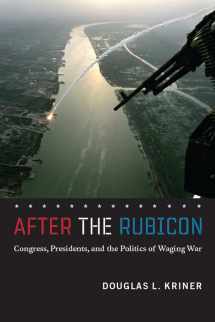
After the Rubicon: Congress, Presidents, and the Politics of Waging War (Chicago Series on International and Domestic Institutions)
ISBN-13:
9780226453552
ISBN-10:
0226453553
Author:
Douglas L. Kriner
Publication date:
2010
Publisher:
University of Chicago Press
Format:
Hardcover
336 pages
FREE US shipping
Book details
ISBN-13:
9780226453552
ISBN-10:
0226453553
Author:
Douglas L. Kriner
Publication date:
2010
Publisher:
University of Chicago Press
Format:
Hardcover
336 pages
Summary
After the Rubicon: Congress, Presidents, and the Politics of Waging War (Chicago Series on International and Domestic Institutions) (ISBN-13: 9780226453552 and ISBN-10: 0226453553), written by authors
Douglas L. Kriner, was published by University of Chicago Press in 2010.
With an overall rating of 3.8 stars, it's a notable title among other
books. You can easily purchase or rent After the Rubicon: Congress, Presidents, and the Politics of Waging War (Chicago Series on International and Domestic Institutions) (Hardcover) from BooksRun,
along with many other new and used
books
and textbooks.
And, if you're looking to sell your copy, our current buyback offer is $0.3.
Description
When the United States goes to war, the nation’s attention focuses on the president. As commander in chief, a president reaches the zenith of power, while Congress is supposedly shunted to the sidelines once troops have been deployed abroad. Because of Congress’s repeated failure to exercise its legislative powers to rein in presidents, many have proclaimed its irrelevance in military matters.After the Rubicon challenges this conventional wisdom by illuminating the diverse ways in which legislators influence the conduct of military affairs. Douglas L. Kriner reveals that even in politically sensitive wartime environments, individual members of Congress frequently propose legislation, hold investigative hearings, and engage in national policy debates in the public sphere. These actions influence the president’s strategic decisions as he weighs the political costs of pursuing his preferred military course.Marshalling a wealth of quantitative and historical evidence, Kriner expertly demonstrates the full extent to which Congress materially shapes the initiation, scope, and duration of major military actions and sheds new light on the timely issue of interbranch relations.


We would LOVE it if you could help us and other readers by reviewing the book
Book review

Congratulations! We have received your book review.
{user}
{createdAt}
by {truncated_author}


